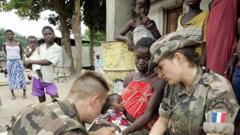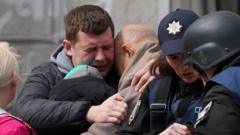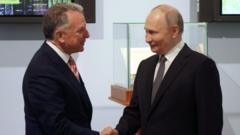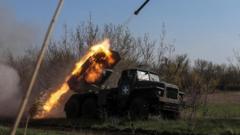The withdrawal aligns with growing anti-French sentiment in the region, reflecting the Ivorian government's commitment to modernizing its armed forces.
French Troops to Withdraw from Ivory Coast, Marking Shift in Military Presence in West Africa

French Troops to Withdraw from Ivory Coast, Marking Shift in Military Presence in West Africa
Ivory Coast's President announces the planned departure of French military forces, signifying a new phase in national sovereignty.
Ivory Coast's President Alassane Ouattara has officially declared that French troops will withdraw from the West African nation, signaling a notable decrease in France's military influence in the region. This announcement came during an end-of-year address and marks a departure from the legacy of French colonial power, which has persisted since independence in the 1960s.
President Ouattara emphasized that the withdrawal is a step towards modernization and self-reliance for Ivory Coast's armed forces. The decision coincides with Senegal's recent pronouncement that French military bases in its territory will also be closed by 2025, reflecting a regional trend of diminishing foreign military presence.
Currently, there are approximately 600 French troops stationed in Ivory Coast, with an additional 350 troops in Senegal. President Ouattara stated, "We have decided in a concerted manner to withdraw French forces from the Ivory Coast," highlighting the collaborative nature of this decision with the Senegalese leadership.
This move follows France's recent military drawdowns in Mali, Burkina Faso, and Niger, where a surge of anti-French sentiment has led to the expulsion of French troops after military coups in those nations. The socio-political dynamics in West Africa have been shifting, with some countries turning towards Russia for military support in combating jihadist threats, further emphasizing the evolving alliances in the region.
Furthermore, Senegal's newly elected President Bassirou Dioumaye Faye has directed a review of defense cooperation, signaling an intention to enhance national sovereignty by phasing out foreign military presence. In contrast, France plans to maintain a small military contingent in Gabon.
While Ivory Coast experienced decades of stability, its peace was shattered by a civil war that underscored the fragility of its democratic progress. Despite past upheavals, it remains a leading cocoa exporter and sustains a relatively higher standard of living than many of its West African neighbors. As the political landscape changes, the impact of these military withdrawals could significantly reshape the security dynamics and international relations in the region.
President Ouattara emphasized that the withdrawal is a step towards modernization and self-reliance for Ivory Coast's armed forces. The decision coincides with Senegal's recent pronouncement that French military bases in its territory will also be closed by 2025, reflecting a regional trend of diminishing foreign military presence.
Currently, there are approximately 600 French troops stationed in Ivory Coast, with an additional 350 troops in Senegal. President Ouattara stated, "We have decided in a concerted manner to withdraw French forces from the Ivory Coast," highlighting the collaborative nature of this decision with the Senegalese leadership.
This move follows France's recent military drawdowns in Mali, Burkina Faso, and Niger, where a surge of anti-French sentiment has led to the expulsion of French troops after military coups in those nations. The socio-political dynamics in West Africa have been shifting, with some countries turning towards Russia for military support in combating jihadist threats, further emphasizing the evolving alliances in the region.
Furthermore, Senegal's newly elected President Bassirou Dioumaye Faye has directed a review of defense cooperation, signaling an intention to enhance national sovereignty by phasing out foreign military presence. In contrast, France plans to maintain a small military contingent in Gabon.
While Ivory Coast experienced decades of stability, its peace was shattered by a civil war that underscored the fragility of its democratic progress. Despite past upheavals, it remains a leading cocoa exporter and sustains a relatively higher standard of living than many of its West African neighbors. As the political landscape changes, the impact of these military withdrawals could significantly reshape the security dynamics and international relations in the region.























